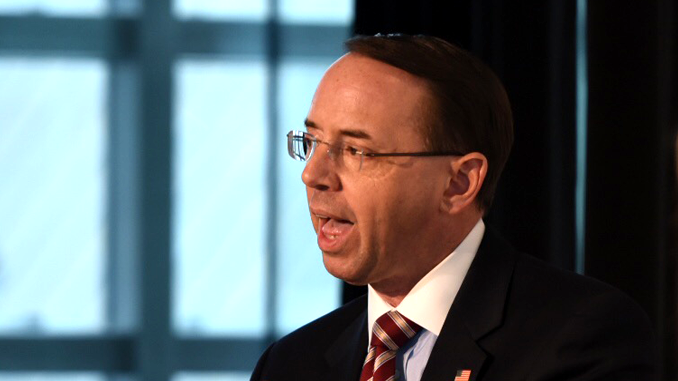
Friday The New York Times reported that according to “several people insisting on anonymity to discuss internal deliberations,” that in spring of 2017, Deputy Attorney General Rod Rosenstein suggested secretly recording President Trump. And also floated the idea of invoking the 25th amendment.
“The people were briefed either on the events themselves or on memos written by F.B.I. officials, including Andrew G. McCabe,” who was the acting FBI director after President Trump fired James Comey. It’s reported that McCabe “documented Rosenstein’s actions and comments.”
According to the article “one week after” Comey was fired, Rosentein met with acting FBI director McCabe and “at least four other senior Justice Department officials,” in order to explain his, “in part,” role in the firing of James Comey.
It is during their meeting that Rosenstein “expressed frustration at how,” President Trump had conducted the new search for another FBI director, telling those gathered, he didn’t feel President Trump was talking the “interviews seriously.”
It was then according to sources that spoke with the New York Times, that Rosenstein suggested “wearing a recording device or “wire,” as he put it.” In order to secretly record President Trump, “when he visited the White House.”
The sources say Rosenstein’s “suggestion of the 25th Amendment,” was talked about directly with McCabe, saying “he [Rosenstein] might be able to persuade Attorney General Jeff Sessions and John F. Kelly,” Kelly at the time was Secretary of Homeland Security, “to mount an effort to invoke the 25th Amendment.”
Rosenstein has denied the New York Times reporting telling the Times in a statement, “The New York Times’s story is inaccurate and factually incorrect. I will not further comment on a story based on anonymous sources who are obviously biased against the department and are advancing their own personal agenda. But let me be clear about this: Based on my personal dealings with the president, there is no basis to invoke the 25th Amendment.”
McCabe offered no comment on the story, however, his attorney Michael R. Bromwhich offered a statement on behalf of his client, “A set of those memos remained at the F.B.I. at the time of his departure in late January 2018. He has no knowledge of how any member of the media obtained those memos.”
A spokeswoman for the Justice Department offered a statement, “from a person who was present when,” Rosenstein “proposed wearing a wire.” The person who “acknowledged” the remark, but would not be named, said the comment was made sarcastically.
The Washington Post has more from the person present during the conversation with McCabe about wearing a wire, stating that it was “never discussed with any intention of recording a conversation with the President.” The person still was not named.
This story follows similar lines as the New York Times op-ed that suggested during last year on the heels of firing Comey that “there were early whispers,” of invoking the 25th Amendment.
The article also follows hours after President Trump walked back his order to release to the public documents that pertain to the Russian Investigation, including text messages from McCabe.

3 Trackbacks / Pingbacks
Comments are closed.